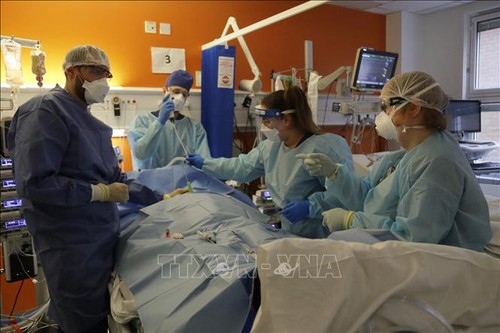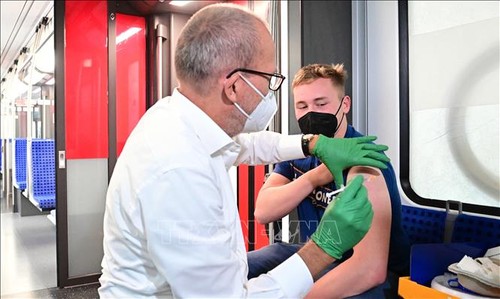 Medical staff treat COVID-19 patients at a hospital in London. (Photo: AFP/VNA) Medical staff treat COVID-19 patients at a hospital in London. (Photo: AFP/VNA)
|
The pandemic has killed more than 5.3 million people and infected more than 270 million worldwide, according to worldometer.info. On average more than 7,300 people die each day from the disease that was declared a global pandemic by the World Health Organization on March 11, 2020.
A global health and economic crisis
The pandemic has triggered a severe financial crisis with an estimated multi-trillion dollar loss, far exceeding the damage caused by all previous financial crises and prompting governments to launch unprecedented stimulus packages. Global tourism has been virtually paralyzed and supply chains have been disrupted. Production in many countries has declined sharply, throwing people out of work. Health systems are strained even in developed countries. Education has been turned upside down. Hundreds of millions of students have been unable to go to school for months at a time.
The pandemic has strongly impacted international relations. Arguments over the virus’s origin has heightened tensions between the US and China. Public resistance to disease prevention measures recommended by health officials has risen even as the new Omicron variant threatens to overwhelm medical resources.
 A health worker gives people COVID-19 vaccine in Sonthofen, Germany. (Photo: AFP/VNA) A health worker gives people COVID-19 vaccine in Sonthofen, Germany. (Photo: AFP/VNA)
|
The pandemic is seriously hampering the UN Sustainable Development Goals, globalization, and international integration. Suffering in wealthier countries like the US shows that economic wealth cannot guarantee sustainable development or social and ecological security.
Globalization and international integration, once considered an irreversible trend, is being reversed. Severe inequality in vaccines is a stark example. In Africa, with 18 shots per 100 people, only 7.5% of the population are fully vaccinated. That figure is 130 shots per 100 people in Europe and 141 shots in the US. Rich countries, which account for 16% of the world's population, have bought 89% of the global supply of vaccines, with some countries ordering even larger quantities than their own population needs. WHO Director-General Tedros Adhanom Ghebreysus called this “shocking inequality”. A UNDP report published in September this year said the COVID-19 pandemic is the most serious economic challenge in history, even more widespread than the global financial crisis of 2008-2009. UN Secretary-General Antonio Guterres said the world is facing the worst health and economic crisis in 90 years.
Flexible adaptation, strengthened international cooperation
The WHO and leading epidemiologists warn that COVID-19 may not end soon. The world has no choice but to adapt to and live safely with the pandemic. Mass vaccination continues because vaccines are proving to be effective against new variants, significantly reducing morbidity and mortality rates. Preventive measures such as wearing masks, disinfecting, and social distancing continue to be followed. International cooperation is needed to rein in the pandemic. No single country or region can contain the pandemic simply by keeping their borders closed. The pandemic can only be controlled through international cooperation and narrowing vaccine inequality by sharing and transferring vaccine production technology.